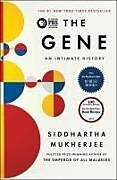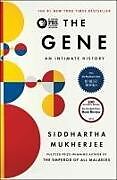The Gene
Einband:
Fester Einband
EAN:
9781476733500
Untertitel:
An Intimate History
Genre:
Medizin
Autor:
Siddhartha Mukherjee
Herausgeber:
Simon & Schuster N.Y.
Anzahl Seiten:
608
Erscheinungsdatum:
01.05.2016
ISBN:
978-1-4767-3350-0
ldquo;Mukherjee is an assured, polished wordsmith . . . who displays a penchant for the odd adroit aphorism and well-placed pun. . . . A well-written, accessible, and entertaining account of one of the most important of all scientific revolutions, one that is destined to have a fundamental impact on the lives of generations to come. The Gene is an important guide to that future.”
Autorentext
Siddhartha Mukherjee is the author of The Gene: An Intimate History, a #1 New York Times bestseller; The Emperor of All Maladies: A Biography of Cancer, winner of the 2011 Pulitzer Prize in general nonfiction; and The Laws of Medicine. He is the editor of Best Science Writing 2013. Mukherjee is an associate professor of medicine at Columbia University and a cancer physician and researcher. A Rhodes scholar, he graduated from Stanford University, University of Oxford, and Harvard Medical School. In 2023, he was elected as a new member of the National Academy of Medicine. He has published articles in many journals, including Nature, The New England Journal of Medicine, Cell, The New York Times Magazine, and The New Yorker. He lives in New York with his wife and daughters. Visit his website at: SiddharthaMukherjee.com.
Klappentext
The #1 NEW YORK TIMES Bestseller
The basis for the PBS Ken Burns Documentary The Gene: An Intimate History
From the Pulitzer Prize–winning author of The Emperor of All Maladies—a fascinating history of the gene and “a magisterial account of how human minds have laboriously, ingeniously picked apart what makes us tick” (Elle).
"Sid Mukherjee has the uncanny ability to bring together science, history, and the future in a way that is understandable and riveting, guiding us through both time and the mystery of life itself." –Ken Burns
“Dr. Siddhartha Mukherjee dazzled readers with his Pulitzer Prize-winning The Emperor of All Maladies in 2010. That achievement was evidently just a warm-up for his virtuoso performance in The Gene: An Intimate History, in which he braids science, history, and memoir into an epic with all the range and biblical thunder of Paradise Lost” (The New York Times). In this biography Mukherjee brings to life the quest to understand human heredity and its surprising influence on our lives, personalities, identities, fates, and choices.
“Mukherjee expresses abstract intellectual ideas through emotional stories…[and] swaddles his medical rigor with rhapsodic tenderness, surprising vulnerability, and occasional flashes of pure poetry” (The Washington Post). Throughout, the story of Mukherjee’s own family—with its tragic and bewildering history of mental illness—reminds us of the questions that hang over our ability to translate the science of genetics from the laboratory to the real world. In riveting and dramatic prose, he describes the centuries of research and experimentation—from Aristotle and Pythagoras to Mendel and Darwin, from Boveri and Morgan to Crick, Watson and Franklin, all the way through the revolutionary twenty-first century innovators who mapped the human genome.
“A fascinating and often sobering history of how humans came to understand the roles of genes in making us who we are—and what our manipulation of those genes might mean for our future” (Milwaukee Journal-Sentinel), The Gene is the revelatory and magisterial history of a scientific idea coming to life, the most crucial science of our time, intimately explained by a master. “The Gene is a book we all should read” (USA TODAY).
Leseprobe
The Gene The Walled Garden
The students of heredity, especially, understand all of their subject except their subject. They were, I suppose, bred and born in that brier-patch, and have really explored it without coming to the end of it. That is, they have studied everything but the question of what they are studying.
—G. K. Chesterton, Eugenics and Other Evils
Ask the plants of the earth, and they will teach you.
—Job 12:8
The monastery was originally a nunnery. The monks of Saint Augustine’s Order had once lived—as they often liked to grouse—in more lavish circumstances in the ample rooms of a large stone abbey on the top of a hill in the heart of the medieval city of Brno (Brno in Czech, Brünn in German). The city had grown around them over four centuries, cascading down the slopes and then sprawling out over the flat landscape of farms and meadowlands below. But the friars had fallen out of favor with Emperor Joseph II in 1783. The midtown real estate was far too valuable to house them, the emperor had decreed bluntly—and the monks were packed off to a crumbling structure at the bottom of the hill in Old Brno, the ignominy of the relocation compounded by the fact that they had been assigned to live in quarters originally designed for women. The halls had the vague animal smell of damp mortar, and the grounds were overgrown with grass, bramble, and weeds. The only perk of this fourteenth-century building—as cold as a meathouse and as bare as a prison—was a rectangular garden with shade trees, stone steps, and a long alley, where the monks could walk and think in isolation.
The friars made the best of the new accommodations. A library was restored on the second floor. A study room was connected to it and outfitted with pine reading desks, a few lamps, and a growing collection of nearly ten thousand books, including the latest works of natural history, geology, and astronomy (the Augustinians, fortunately, saw no conflict between religion and most science; indeed, they embraced science as yet another testament of the workings of the divine order in the world). A wine cellar was carved out below, and a modest refectory vaulted above it. One-room cells, with the most rudimentary wooden furniture, housed the inhabitants on the second floor.
In October 1843, a young man from Silesia, the son of two peasants, joined the abbey. He was a short man with a serious face, myopic, and tending toward portliness. He professed little interest in the spiritual life—but was intellectually curious, good with his hands, and a natural gardener. The monastery provided him with a home, and a place to read and learn. He was ordained on August 6, 1847. His given name was Johann, but the friars changed it to Gregor Johann Mendel.
For the young priest in training, life at the monastery soon settled into a predictable routine. In 1845, as part of his monastic education, Mendel attended classes in theology, history, and natural sciences at Brno’s Theological College. The tumult of 1848—the bloody populist revolutions that swept fiercely through France, Denmark, Germany, and Austria and overturned social, political, and religious orders—largely passed him by, like distant thunder. Nothing about Mendel’s early years suggested even the faintest glimmer of the revolutionary scientist who would later emerge. He was disciplined, plodding, deferential—a man of habits among men in habits. His only challenge to authority, it seemed, was his occasional refusal to wear the scholar’s cap to class. Admonished by his superiors, he politely complied.
In the summer of 1848, Mendel began work as a parish priest in…

Leider konnten wir für diesen Artikel keine Preise ermitteln ...
billigbuch.ch sucht jetzt für Sie die besten Angebote ...
Die aktuellen Verkaufspreise von 6 Onlineshops werden in Realtime abgefragt.
Sie können das gewünschte Produkt anschliessend direkt beim Anbieter Ihrer Wahl bestellen.
Loading...
Die aktuellen Verkaufspreise von 6 Onlineshops werden in Realtime abgefragt.
Sie können das gewünschte Produkt anschliessend direkt beim Anbieter Ihrer Wahl bestellen.
| # | Onlineshop | Preis CHF | Versand CHF | Total CHF | ||
|---|---|---|---|---|---|---|
| 1 | Seller | 0.00 | 0.00 | 0.00 |
